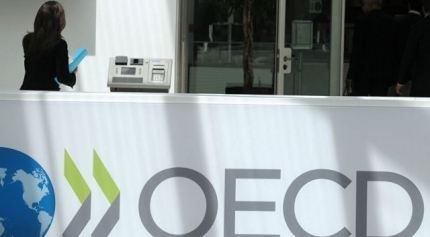Korea ranks 2nd in property tax-to-GDP among OECD members
Korea’s real estate tax burden grew at fastest pace in 2020
By Kim Yon-sePublished : Jan. 7, 2022 - 14:33

SEJONG -- South Korea ranked second among members of the Organization for Economic Cooperation and Development in the ratio of property tax to gross domestic product in 2020, with its on-year growth posting No. 1 and ranking in terms of the ratio climbing by four notches from a year earlier.
According to a recent analysis by the Paris-based organization, Korea recorded 3.97 percent in the ratio of property tax -- in which the capital gains tax on trading of homes and land takes up a dominant portion -- to GDP as of 2020.
Canada topped the list with its figure reaching 4.15 percent, followed by Korea and France which tied for second.
Of the 38 members, the figure for Australia was not included.
The OECD clarified that the property tax includes “taxes on immovable property or net wealth, taxes on the change of ownership of property through inheritance or gift and taxes on financial and capital transactions.”
Though Korea stayed at No. 6 with 3.11 percent in 2019, the nation saw the ratio surge 0.86 percentage point in just one year, which was the highest growth in the OECD.
In addition, the ratio of property tax-to-GDP grew fastest in terms of growth for three years since 2017, when the figure was 2.96 percent, placing at ninth. The ranking rose to seventh with 3.09 percent in 2018.
During the 2017-2020 period, Korea overtook Greece, Israel, Belgium, Luxembourg, the UK and the US.
Korea posted a 1.01 percentage point increase -- the highest among the members -- in the three-year period. Some countries, including the US, the UK, Italy, Spain, Sweden, Mexico and Turkey, saw the ratio fall.
Though Japan also recorded a climb over the corresponding period, its ratio inched up only 0.1 percentage point to 2.63 percent as of 2020.
While the organization has yet to publicize the 2020 average for its 38 members, the average was 1.87 percent in 2017, 1.81 percent in 2018 and 1.8 percent in 2019.
In this trend, there is a possibility that Korea will become the nation whose household burden on real estate taxes is the highest in the OECD, overtaking Canada in the coming analysis for 2021 or 2022.
Under the Moon Jae-in administration since May 2017, Korea has put much focus on the comprehensive real estate tax as part of its effort to carry out active taxation on multiple-home owners and land owners.
In addition, a large proportion of owners of one home in Seoul and some major cities have faced heavier property taxes in the wake of record-breaking growth in housing prices over the past four years.
According to a recent analysis by the Paris-based organization, Korea recorded 3.97 percent in the ratio of property tax -- in which the capital gains tax on trading of homes and land takes up a dominant portion -- to GDP as of 2020.
Canada topped the list with its figure reaching 4.15 percent, followed by Korea and France which tied for second.
Of the 38 members, the figure for Australia was not included.
The OECD clarified that the property tax includes “taxes on immovable property or net wealth, taxes on the change of ownership of property through inheritance or gift and taxes on financial and capital transactions.”
Though Korea stayed at No. 6 with 3.11 percent in 2019, the nation saw the ratio surge 0.86 percentage point in just one year, which was the highest growth in the OECD.
In addition, the ratio of property tax-to-GDP grew fastest in terms of growth for three years since 2017, when the figure was 2.96 percent, placing at ninth. The ranking rose to seventh with 3.09 percent in 2018.
During the 2017-2020 period, Korea overtook Greece, Israel, Belgium, Luxembourg, the UK and the US.
Korea posted a 1.01 percentage point increase -- the highest among the members -- in the three-year period. Some countries, including the US, the UK, Italy, Spain, Sweden, Mexico and Turkey, saw the ratio fall.
Though Japan also recorded a climb over the corresponding period, its ratio inched up only 0.1 percentage point to 2.63 percent as of 2020.
While the organization has yet to publicize the 2020 average for its 38 members, the average was 1.87 percent in 2017, 1.81 percent in 2018 and 1.8 percent in 2019.
In this trend, there is a possibility that Korea will become the nation whose household burden on real estate taxes is the highest in the OECD, overtaking Canada in the coming analysis for 2021 or 2022.
Under the Moon Jae-in administration since May 2017, Korea has put much focus on the comprehensive real estate tax as part of its effort to carry out active taxation on multiple-home owners and land owners.
In addition, a large proportion of owners of one home in Seoul and some major cities have faced heavier property taxes in the wake of record-breaking growth in housing prices over the past four years.



![[AtoZ into Korean mind] Humor in Korea: Navigating the line between what's funny and not](http://res.heraldm.com/phpwas/restmb_idxmake.php?idx=644&simg=/content/image/2024/04/22/20240422050642_0.jpg&u=)
![[Exclusive] Korean military set to ban iPhones over 'security' concerns](http://res.heraldm.com/phpwas/restmb_idxmake.php?idx=644&simg=/content/image/2024/04/23/20240423050599_0.jpg&u=20240423183955)


![[Herald Interview] Why Toss invited hackers to penetrate its system](http://res.heraldm.com/phpwas/restmb_idxmake.php?idx=644&simg=/content/image/2024/04/22/20240422050569_0.jpg&u=20240422150649)
![[Graphic News] 77% of young Koreans still financially dependent](http://res.heraldm.com/phpwas/restmb_idxmake.php?idx=644&simg=/content/image/2024/04/22/20240422050762_0.gif&u=)






![[Exclusive] Korean military to ban iPhones over security issues](http://res.heraldm.com/phpwas/restmb_idxmake.php?idx=652&simg=/content/image/2024/04/23/20240423050599_0.jpg&u=20240423183955)



![[Today’s K-pop] Ateez confirms US tour details](http://res.heraldm.com/phpwas/restmb_idxmake.php?idx=642&simg=/content/image/2024/04/23/20240423050700_0.jpg&u=)